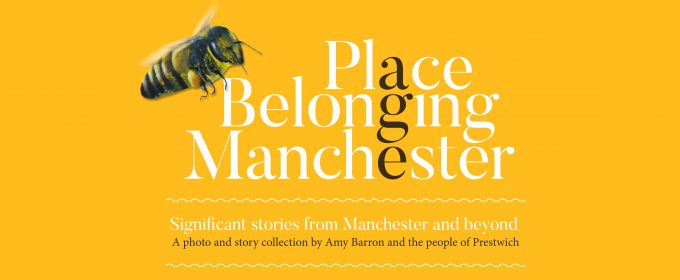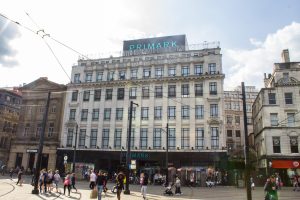Amy Barron, a postgraduate researcher in Human Geography examines why it’s important to understand older people’s individual experiences when creating age-friendly policies.
- Across the Greater Manchester region, older people have different histories and different lives; policies focused on improving the lives of older-citizens must keep sight of these differences and individualities.
- Through my research I have explored the diverse ways in which older people create a sense of place for themselves in Greater Manchester bringing to the fore the subtle ways in which different older people relate to different places – this provides a way to disrupt reductive narratives of older age.
- Viewing older age in this way leads to a more nuanced and less presumptuous understanding.
Older people in our region
We need to understand older age in a more nuanced way. This is the principal message of ‘Place, Belonging, Manchester’, a photo and story collection created by myself and participants, which will be exhibited at the Festival of Ageing 2018.
People have different histories, hobbies and hopes. Whilst there are some common aspects, older people in Prestwich lead different lives than those in Pendlebury, those in Didsbury are different from Droylsden, and Chorlton different from Cheetham Hill. And there are manifold differences even within these places. Simply put, older people are different and our region is too, so it’s important not to take a one-size fits all approach in making Greater Manchester Age-Friendly.
The Festival of Ageing
The city of Manchester and Greater Manchester are leading the way in all things ‘Age-Friendly’. The city-region is taking forward its long-standing ambition to make urban living more inclusive, accessible and enjoyable for its older residents with a two-week extravaganza celebrating positive and diverse images of ageing. The Festival of Ageing is taking place across Greater Manchester between the 2nd and 15th July and is encouraging those aged 50 and over to come along and enjoy a range of fun activities including music, dance, craft and physical activities. With boroughs hosting various fringe events, the city-region is placing older people at the heart of city life.
Disrupting reductive narratives of older age
What does the term ‘older age’ mean to you? Quite often it is understood as a period of dependency, decline and disengagement. This is something that my research – and the photo and story collection that arises from it – has taken issue with.
As a Geographer, I am sensitive to how space and place matter. I’ve explored the diverse ways in which older people create a sense of place for themselves in our city-region. Bringing to the fore the subtle ways in which different older people relate to different places – along with some unifying qualities of Mancunian communities – provides a way to disrupt reductive narratives of older age.
This should not be taken as an attempt to unearth obscure counter clichés of older age, although of course it may. Rather, it is an attempt to bring the more individual aspects of older people’s lives to the fore, regardless of whether or not these fit representational norms.
The photographs and stories shared were created whilst walking and talking with older people from Prestwich about places of personal significance within the city-region. Relevant to communities and policy-makers alike, the collection is intended to share insights and generate discussion about older people’s senses of place.
This collection illustrates the often-overlooked contributions that older people and older age make to societies at large, and to everyday life. One story in the collection, a conversation with Billy aged 69, reveals how the Prestwich Cricket and Tennis club would struggle to stay afloat without the valuable work of its older volunteers.
“We get fantastic support, and it’s all voluntary. The guy running the tennis camp runs all our coaching and everything else, all the people gardening are voluntary, I am voluntary. I work here 7 days a week, and when I’m not, I walk my dog here. It’s very hands on. We don’t employ a landlord or anything like that, we do it ourselves. We want to move forward, we’re not going to stand still. When I say this place is run on volunteers, we are struggling as it gets quite demanding and a lot of our trustees are quite old. This club would not operate without our older volunteers.”
Moreover, the stories highlight the way that feelings and practices surrounding everyday activities – such as strolling around the neighbourhood, attending a craft group, or walking the dog – are in many ways the product of an individual’s past and their feelings about the future. Indeed, many of these histories are shared, a common memory was of the old Lewis’ department store in Manchester or the sunken Piccadilly Gardens. Bella, 83 explained her role at Lewis’:
“I was a – shall I give it a posh name? – I was a display artist at, well you won’t know it. Where Primark is now, was a big store called Lewis’ and I used to make the most fabulous displays. When it was the Queen’s coronation we made papier-mâché coats of arms and crowns for all the different shops. When Lewis’ was closing I went to the staff entrance and asked if I could have look around because I was so upset, so they let me in and I had a little look around. Oh, I did love it.”
The former Lewis’ Department Store
The importance of engagement
Spurred on with some motivational quotes from participants, Festival goers will be encouraged to share their own memories and reflect on what older age means to them in a scrapbook after browsing the event. As Jude, 64, told me, “the biggest thing is to not presume anything about an older person because that can be so misleading”. Understanding older age in this way allows a more nuanced and less presumptuous understanding. This is an important message for policymakers and general society alike. It is only in engaging with the communities and individuals themselves that we can truly begin to understand and celebrate the diversities that ‘older age’ beholds.
Interested in coming along? So far, the collection will be shared at the following venues:
- Manchester Art Gallery, Festival of Ageing Launch, Monday 2nd July, 12:00 – 16:00
- The Millgate Shopping Centre, Bury Main Festival Event, Wednesday 4th July 9:00 – 17:00
- Bury Art Museum, 10th – 14th July, 10:00 – 17:00
- The ESRC Festival of Social Science 2018, November, venue to be confirmed
- Prestwich Arts Festival, 29th – 30th September, venue to be confirmed
Please tweet your thoughts using the hashtag #PlaceManchester and visit amycbarron.com for further information.

